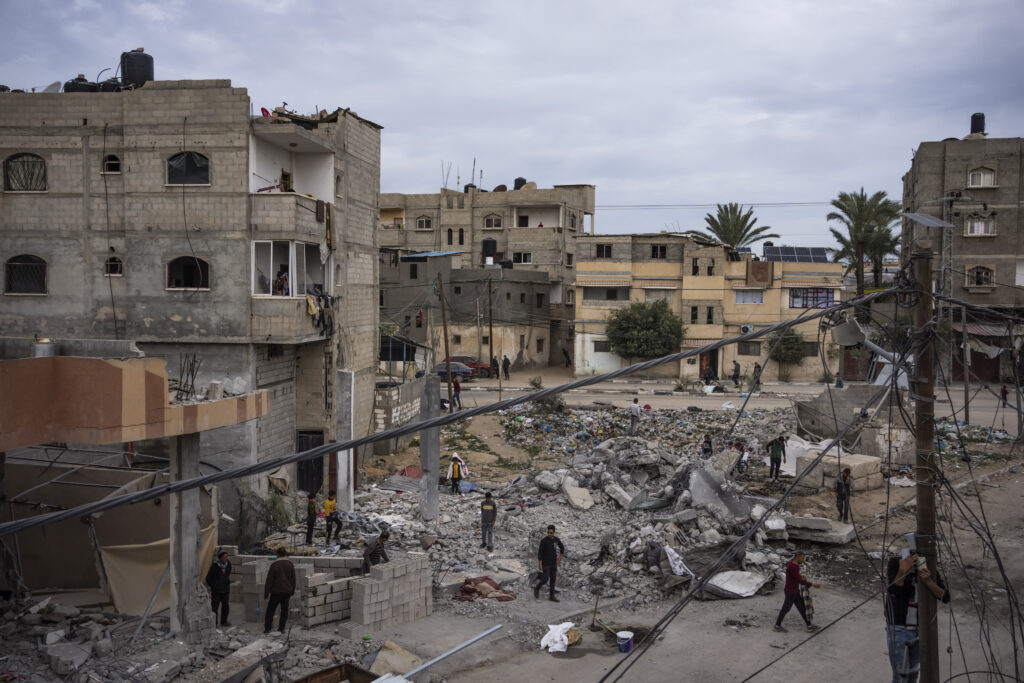Both Israeli and Hamas leaders are reacting to President Joe Biden’s recent comments that he is hopeful a ceasefire agreement could be reached within a week.
The U.S. president and his administration have spent months working with both sides, as well as the Qatari and Egyptian governments, which are also acting as mediators between Israel and Hamas, on a potential second ceasefire agreement in exchange for the release of the hostages Hamas is still holding in Gaza and has since the Oct. 7 attack that prompted the war.
Israeli Prime Minister Benjamin Netanyahu was reportedly “surprised” by Biden’s comments about an agreement that could be in place “by next Monday,” as Biden said, according to ABC News, while a Hamas official told Reuters that there are “still big gaps to be bridged,” and added, “The primary and main issues of the ceasefire and the withdrawal of Israeli forces are not clearly stated, which delays reaching an agreement.”
During an outing to get ice cream on Monday, Biden told reporters he hoped to have a deal in place by the “beginning of the weekend — I mean the end of the weekend,” and then said his “hope is by next Monday, we’ll have a ceasefire.”
The Qatari Ministry of Foreign Affairs spokesman, Majed al Ansari, said they hadn’t overcome the hurdles that stand in the way of a deal.
“We don’t have a final agreement on any of the issues that are hampering reaching an agreement. We remain hopeful, not necessarily optimistic, that we can announce something today or tomorrow. But we remain hopeful that we can get to some kind of agreement,” Ansari said.

The Israeli military first invaded Gaza in mid-October. They urged Palestinians to flee south as they began operations in the northern part of the enclave and they continued to travel further south as Israeli operations migrated that way as well. There are now more than 1 million Palestinian refugees sheltering in Rafah, the southern city that’s along the Gaza-Egyptian border.
Israeli leaders have said its military has to carry out operations in Rafah to complete its mission of removing Hamas from power and demilitarizing the group. U.S. and Israeli officials have said Hamas terrorists have traveled south as well and do so in the major tunnel system, often likened to a metro system, that Hamas has built under much of the densely populated parts of Gaza. A major strategy of Hamas is to embed itself within and underneath Palestinian civilians in order to either force the Israeli forces not to attack or to incur civilian casualties.
Israel has said it would begin its military operations on March 10 if a ceasefire agreement is not reached by then, which coincides with the beginning of the Muslim holy month of Ramadan. The Israeli government has said it would evacuate civilians out of harm’s way, though they have yet to release details on how they’ll do that.
Biden and other world leaders, as well as human rights organizations, have issued grave warnings about astronomical civilian casualty counts if Israel conducts full-scale operations in Rafah without properly accounting for them.
The Gaza health ministry, which is controlled by Hamas, has said there have been more than 29,000 Palestinians killed during the war, though that number does not differentiate between civilians and combatants.
Biden said in an interview on Late Night with Seth Meyers on Monday that Israel had agreed not “to engage in activities during Ramadan, as well, in order to give us time to get all the hostages out.”
There are roughly 130 of the more than 240 hostages still being held in Gaza. More than 100 were freed during a weeklong ceasefire that took place in late November. There are six Americans still being held hostage. It’s unclear whether they’re still alive, though they are also believed to be held in the tunnels underneath Rafah.
The Israeli and U.S. governments are in agreement that Hamas should not continue to govern Gaza after the conclusion of the war but disagree on many other aspects of the day-after decisions, including on the subject of Palestinian statehood, which the Biden administration and many other European and Middle Eastern governments are seeking.
The Biden administration is pursuing a long-term agreement that would include the creation of a Palestinian state in exchange for recognition of Israel’s existence and diplomatic relations from other Middle Eastern countries, including Saudi Arabia.
CLICK HERE TO READ MORE FROM THE WASHINGTON EXAMINER
A temporary ceasefire agreement between Israel and Hamas “gives us time to begin to move in directions that a lot of Arab countries are prepared to move in. For example, Saudi Arabia is ready to recognize Israel. Jordan is, Egypt, six other states I’ve been working with, Qatar,” Biden said during the interview with Meyers. “They also have to make — take advantage of an opportunity to have peace and security for Israelis and Palestinians, who are being used as pawns by Hamas. So there’s a process underway that I think, if we get that temporary ceasefire, we’re going to be able to move in a direction where we can change the dynamic and not have a two-state solution immediately, but a process to get to a two-state solution, a process to guarantee Israel’s security and the independence of the Palestinians, but without them being able to, for example, invite in, you know, another country to provide their defenses.”
The U.S.’s negotiations regarding Saudi recognition and starting diplomatic relations with Israel were close to completion prior to Hamas’s Oct. 7 attack that prompted the war. Biden has said he believes Hamas carried out its attack, which included the murders of roughly 1,200 people, to stop this deal from coming to fruition.
